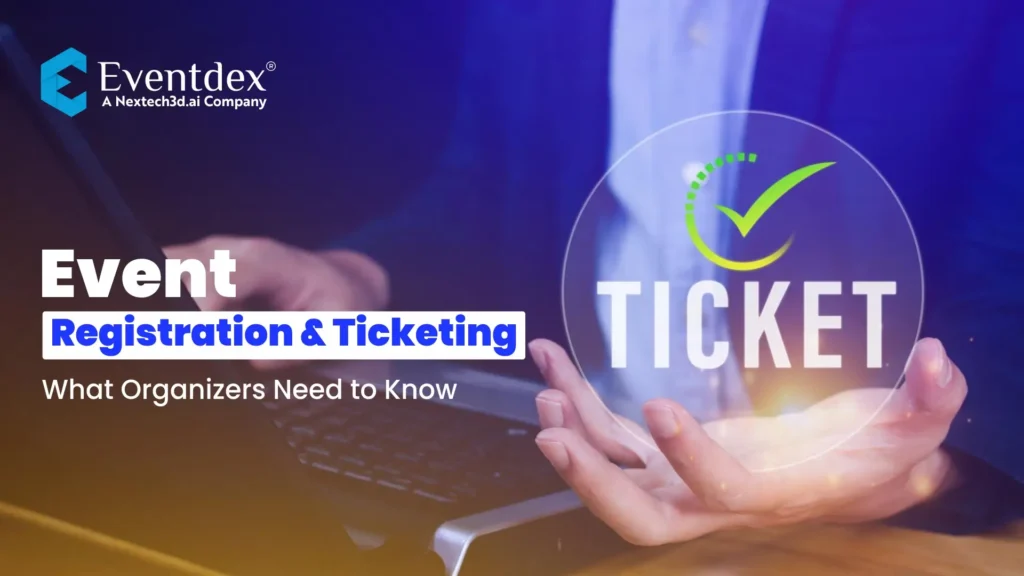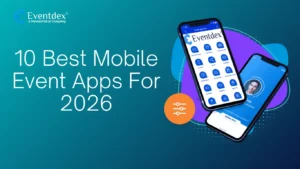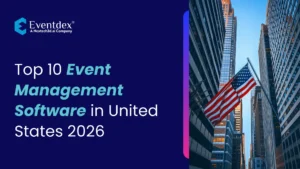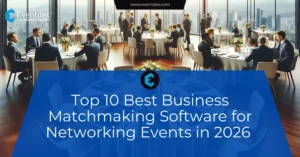Event Registration & Event Ticketing Software: What Organizers Need to Know
Event organizers are entering a new chapter in the coming years. Expectations have changed; attendees behave differently, and the tools used to run events must now work faster, smarter, and more intuitively than ever before. This is why choosing the right event registration software and event ticketing software matters more today than it ever did. People nowadays want registrations that load quickly, ticketing options that are easy to navigate, confirmations that arrive instantly, and check-in experiences that feel almost invisible.
This creates a very real challenge. The landscape of event tech solutions has grown, the demand for personalization has intensified, and the line between pre-event and onsite experience is thinner than before. To stay competitive, event teams must understand the latest industry standards, evaluate features carefully, and adopt mobile-friendly event platforms that keep pace with modern audiences. Below is a comprehensive, expert-driven look at what organizers need to know about event registration and ticketing.
Why 2026 Will be a Turning Point for Event Registration and Ticketing
The world of attendee expectations has shifted significantly. People expect speed, clarity, convenience, and trust in the tools they use to sign up for and attend events. The rise of contactless event check-in solutions, the growth of QR codes for events, the demand for a smooth tech experience at events, and the need for scalable event tech systems have all influenced how platforms are designed.
Many organizers now run hybrid, international, or multi-track events where attendees move rapidly between sessions. This demands event tech integration with CRM, advanced personalization tools, and automated workflows that reduce manual labor.
The industry has also seen dramatic growth in:
- Mobile-first registration journeys
- Instant digital ticketing
- Secure payment processing
- Badge printing automation
- Real-time data dashboard for events
- On-site attendee tracking
- Event networking tools that drive engagement
- Offline features event app for venues with poor connectivity
More than anything, events are becoming smarter. The tools used in 2025 are no longer simple sign-up pages. They represent an ecosystem of systems that talk to one another to create a unified experience.
The Role of Event Registration Software
Modern event registration software is the backbone of event operations. In previous years, registration tools were primarily transactional. They focused on filling out forms, collecting attendee data, and delivering confirmation emails. That era is over. Today, event registration platforms must support:
-
Personalized Registration Journeys
Attendees no longer tolerate generic forms. Registration must adapt based on ticket type, category, profile, or past behavior. Dynamic fields, conditional logic, and smart routing guide each attendee through the most relevant path.
-
Frictionless Mobile Registrations
A majority of event sign-ups now come from mobile devices. Mobile-friendly event platforms must load quickly, handle payments smoothly, and reduce multi-step forms that lead to drop-offs.
-
Deep Data Collection
Organizers rely heavily on registration data to shape their programming, marketing, and follow-up. This makes data accuracy very important. Platforms must support advanced field mapping, real-time validation, and analytics-driven insights.
-
Strong Custom Branding
Events these days need to look consistent across all digital touchpoints. That means registration pages must support custom colors, brand elements, session visuals, and a tailored attendee journey.
-
Secure, Global Payment Processing
Payment security is a top selection factor. Organizers now expect PCI-compliant event payment gateways, fraud detection, and multi-currency support for international attendees.
-
Automation for Administrative Efficiency
Event teams cannot afford repetitive manual tasks. The best event platforms now automate confirmations, reminders, receipts, badge assignments, and session enrollments without requiring human involvement.
-
Integration with Event Check-in Technology
Modern event registration tools must connect seamlessly with event check-in technology, contactless check-in solutions, badge scanning tech, and on-site printers.
-
CRM and Marketing Sync
Registration is a major lead source. Platforms must integrate with systems like Salesforce, HubSpot, and marketing automation tools for accurate segmentation and post-event follow-up.
Organizers choosing event registration software in 2025 must evaluate platforms that do far more than handle attendee names. They must solve operational challenges, reduce friction, and enable smarter decision-making.
What Event Ticketing Software Must Deliver in 2025
Event ticketing tools are under more pressure than ever. As events grow in complexity, organizers expect ticketing systems to stay reliable even at scale. Here is what the best event ticketing software must support in 2025:
-
Multiple Event Ticket Types
Events often have early bird pricing, VIP access, group tickets, student passes, donation options, and add-ons. Event ticketing software must support layered ticket rules and dynamic pricing.
-
Easy Upselling
Modern platforms allow organizers to offer add-on services during checkout, such as workshops, premium seating, merchandise, or access to exclusive lounges. This increases event revenue significantly.
-
Real-time Ticket Inventory Tracking
Organizers require accurate, instantaneous insights into ticket sales across all categories. This helps forecasting, budgeting, and marketing optimization.
-
Mobile-first Digital Tickets
Attendees expect to receive digital confirmation instantly. QR-code-based tickets are standard, allowing easy entry through badge scanning tech or handheld scanners.
-
Fraud Prevention
As ticket resale and duplication continue to grow, event ticketing software must provide barcoded tickets, unique identifiers, check-in syncing, and secure validation.
-
Transparent Reporting
Ticket revenue, coupon usage, payment breakdowns, marketing source attribution, and sales patterns must be available in real time.
-
No Hidden Fees
Attendees are increasingly sensitive to unexpected charges. This is why platforms must communicate taxes, service fees, and add-on pricing clearly.
-
Integration with Registration and CRM
Ticketing data cannot live in isolation. It must connect seamlessly with:
- Event registration
- Lead retrieval
- CRM
- Finance tools
- Marketing automation
The line between registration and ticketing is nearly invisible. Organizers prefer a single system that handles both efficiently.
Key Trends Shaping Event Registration and Ticketing in 2025
Choosing the right event registration and event ticketing software isn’t just a technical decision anymore. The landscape has shifted dramatically, and 2025 is shaping up to be a year where attendee expectations, industry standards, and technology innovation converge. Organizers who understand these trends will be better prepared to deliver smoother, more intuitive, and more profitable event experiences. Below is a breakdown of the top trends shaping the industry and the thinking behind why these shifts matter.
-
Mobile Domination
Mobile has become the primary touchpoint for most attendees, and this influence continues to grow stronger every year. People now rely on their smartphones to do everything from exploring event websites to scanning tickets onsite. Because of this, mobile-friendly event platforms are no longer optional—they are the starting point for any viable event registration and event ticketing strategy.
Attendees expect smooth scrolling, fast-loading forms, and interfaces that don’t force them to zoom in or hunt for buttons. If registration takes too long or looks outdated, drop-off rates skyrocket.
Beyond basic optimization, leading platforms now integrate event mobile app features directly into the registration workflow, such as saved attendee profiles, personalized recommendations, and session bookmarking. This creates continuity between pre-event planning and live-event engagement.
Interactive elements are also moving to mobile. More organizers are embracing interactive event technology like live Q&A, surveys, and push notifications to keep attendees engaged throughout the event cycle. Because mobile devices are so deeply embedded in attendees’ lives, making them the central hub for the entire event journey simply aligns with natural user behavior.
-
Contactless Operations
While the pandemic sparked the shift toward touch-free processes, attendee habits have cemented these behaviors for good. Today’s audiences prefer check-ins that feel instant and require minimal human interaction. That means tools supporting contactless check-in solutions are now considered essential, not premium upgrades.
QR confirmations have become a global default. Sending attendees a scannable QR code for events directly after registration reduces confusion and speeds up entry lines dramatically. Venues and organizers appreciate this shift because it eliminates the need for manual lookups or dependency on staff availability.
Similarly, badge scanning tech plays a critical role in fast-moving environments. Instead of printers or laptops slowing down the process, handheld devices or mobile apps enable immediate badge creation and attendee verification. The result is a more efficient flow at the venue entrance and a better first impression.
This shift also drives strong operational advantages. With tech to reduce waiting at event check-in, organizers can manage crowds better, reduce staffing needs, and reassure attendees with a frictionless, predictable process.
-
Increased Use of Real-Time Dashboards
Data drives decision-making in all industries, and events are no exception. Organizers no longer want static reports or post-event summaries—they want information as it unfolds. A real-time data dashboard for events provides insights into everything from live check-in counts to session popularity and registration funnel performance.
At a high level, this helps event teams identify immediate bottlenecks. For example:
- A sudden check-in rush can signal the need for more on-site staff
- A session filling faster than expected may require additional seating
- A spike in abandoned registrations might indicate a technical glitch
These insights are no longer luxury features. Teams now expect event analytics tools that integrate across the entire lifecycle: ticket sales, attendee behavior, exhibitor performance, and even sponsorship engagement.
The biggest competitive advantage is agility. Organizers don’t have to wait until after the event to understand what worked. They can adjust in real time, improving the attendee experience on the spot and maximizing event ROI.
-
Automation Across All Touchpoints
Events involve hundreds of repetitive tasks. Manual processing leaves room for error and consumes time that planners simply don’t have. Automation is now the single most impactful efficiency driver across registration and ticketing workflows.
Modern systems support everything from automated confirmation emails to auto-routed badges and seat assignments. With strong event tech solutions, organizers can drastically reduce friction and eliminate delays that frustrate attendees.
Today’s tools also use event experience tools to streamline logistics, such as:
- Automatic reminders for sessions
- Capacity alerts based on real-time room counts
- Smart ticket upgrades triggered by attendee interest patterns
- Auto-generated onsite badges linked directly to pre-registration data
One major improvement is the rise of event registration workflow automation, which connects every backend process into one cohesive pipeline. This reduces handoffs, lowers the risk of human error, and ensures every attendee receives accurate, timely communication.
-
Personalization at Scale
Attendees expect more from events than a generic program. They want sessions tailored to their interests, targeted networking opportunities, and communication that feels relevant rather than mass-emailed.
This shift has pushed personalization to the forefront of event strategy.
Tools that support using technology to personalize event experience give attendees a curated roadmap instead of a one-size-fits-all agenda. Platforms that track behavior and preferences can suggest sessions or booths that align with individual interests.
Beyond agendas, personalization extends to networking. With event networking tools, attendees can match with peers, schedule meetings, and explore curated suggestions based on job role, goals, or areas of interest.
Strong personalization also drives engagement. With the best event technology tools for engagement, organizers can create targeted content tracks, push personalized notifications, and offer gamified experiences that reward participation.
The combination of behavior insights, automated recommendations, and smart communication transforms the attendee journey. Instead of passive participation, attendees become active contributors.
-
Offline Support
Even top-tier venues can suffer from WiFi instability. When check-in or ticket validation depends on internet connectivity, everything can fall apart. That’s why platforms with strong offline capabilities have become a necessity.
Events now expect offline features in event app technologies that continue to operate without interruption. Registration staff should be able to check in attendees, scan passes, and validate tickets, regardless of the network environment.
The rise of offline ticket validation ensures that entry lines keep moving even during outages. Apps simply store encrypted data locally and sync automatically once the connection returns.
This is directly connected to attendee perception. When onsite operations remain stable despite network issues, attendees immediately experience a smooth tech experience at events. They don’t see delays, staff frustration, or long queues—they simply walk in.
Offline support has become a foundational requirement for high-volume events, trade shows, expos, and conferences.
-
Integration with Sales and Marketing Systems
Event data is far more valuable than it used to be. Registrations, ticket sales, session check-ins, exhibitor interactions, and attendee behavior all feed into broader business objectives. Because of this, organizers demand tools with strong event tech integration with CRM platforms. This trend is driven by two realities:
- Events generate important sales and marketing signals
- Organizations want this data inside their systems, not isolated in event tools
Integrations allow:
- Automatic lead routing
- Behavioral scoring based on session attendance
- Triggered nurture campaigns post-event
- Cross-team visibility between sales, marketing, and events
When an attendee downloads content, upgrades a ticket, or scans at a booth, that information flows directly into CRM workflows without manual intervention.
Integrations also improve personalization, event design, and business forecasting. Instead of events sitting apart from organizational strategy, they become deeply connected to revenue growth, customer engagement, and long-term relationships.
Wrapping Up
Event registration and ticketing in today’s time demand far more than simple digital forms or basic ticket sales. Organizers must adopt smarter systems that deliver automation, personalization, analytics, and a flawless attendee journey. The right technology transforms the entire event and strengthens its value for attendees, exhibitors, sponsors, and stakeholders.
Ready to Upgrade Your 2025 Events? If you want an integrated platform that handles registration, ticketing, check-in, mobile engagement, analytics, CRM sync, and offline support, Eventdex, a Nextech3D.AI company, offers a comprehensive event management ecosystem that brings registration, ticketing, mobile engagement, analytics, and onsite operations under one unified platform.̧ Connect with us and see how quickly you can upgrade your next event.







